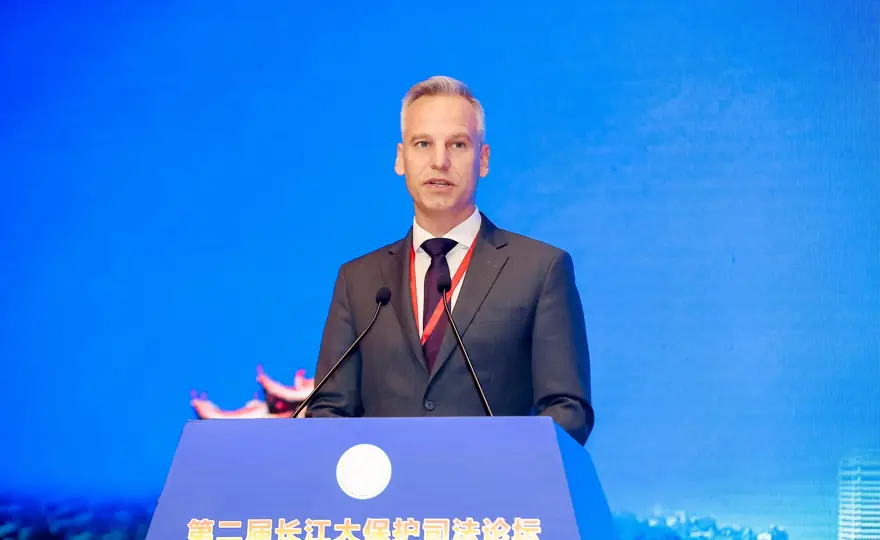ClientEarth Communications
26th November 2023


Wuhan, Hubei, China – Last week, Dimitri de Boer, ClientEarth’s Regional Director of Programmes for Asia spoke at the 2nd Yangtze River Protection and Judicial Forum, which is aimed at stepping up conservation of the Yangtze River.
The Yangtze River Protection Judicial Forum, held between 25 to 26 November 2023, was jointly organised by the Hubei Provincial High People's Court, the Yangtze River Maritime Law Society of the China Law Society, Wuhan University, Huazhong University of Science and Technology, Zhongnan University of Economics and Law and the People's Court's Environmental Resources Trial Theory Research Base. Top judges and lawmakers from all provinces along the Yangtze River basin participated in the forum.
The journey of ClientEarth’s involvement in the Yangtze River Protection Law began in 2018, when we co-hosted an international symposium on environmental justice with the Supreme People's Court of the People’s Republic of China. During this session, we learned that China was going to legislate on environmental protection in the Yangtze River basin. In 2019, through the EU-China environmental cooperation project, we supported the Ministry of Ecology and Environment, the Legislative Affairs Committee of the Standing Committee of the National People's Congress and relevant units to visit Europe to learn EU’s experience of cross-regional river basin management, such as the Rhine. Concurrently in 2019, under ClientEarth’s cooperation with the China Council for International Cooperation on Environment and Development, we had a project with Asian Development Bank (ADB) and Chinese Academy of Environmental Planning (CAEP), to support Yangtze River Law making.
ClientEarth prepared and submitted three sets of comments to the first draft Yangtze River Protection Law in January 2020. Of the three, one was done in cooperation with ADB and European experts and another was on behalf of other international experts and organizations. Our own points emphasized stronger provisions for information disclosure, public participation, and access to justice, as well as an increased emphasis on climate mitigation and adaptation. It was heartening to note that our comments on information disclosure and public participation was very well received. The point on access to justice was also well noted.
In 2021, ClientEarth joined the prosecutors of the public interest litigation department of the Supreme People’s Procuratorate for a field visit to Hubei, where we were briefed on their efforts to implement the Yangtze River Protection Law, and the 10-year fishing ban in the Yangtze River. Enforcement to curb key environmental violations, including illegal fishing, illegal aquaculture, illegal mining and sand excavation, illegal industrial pollution etc have all been stepped up.
Dimitri gave an opening speech at the 2nd Yangtze River Protection and Judicial Forum, where he remarked “Following the issuing of the Yangtze River Protection Law in 2020, China’s top-level commitment to step up conservation of the Yangtze River and stop its over-development has been strictly implemented. As a result, Yangtze finless porpoise have returned to the Yangtze River and their population have risen by 23% compared to five years ago.”
“Environmental justice has played an important role in Yangtze River protection. The evolvement of China’s specialized environmental justice is unique in the world, and the Chinese model is a worthy case study for other countries. The work of China’s judges and prosecutors ensures strong implementation and enforcement of environmental laws, which is key to solving the challenges of environmental pollution, biodiversity loss and climate change.”
This natural progression from lawmaking to enforcement is testament to China’s continued commitment towards climate and environmental justice. We will continue to deepen our cooperation with China's judiciary, and share this progress with the international community, to foster a deeper understanding of China's model of environmental justice.